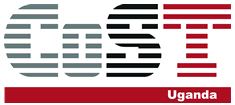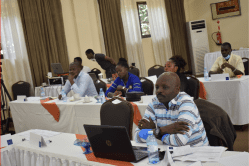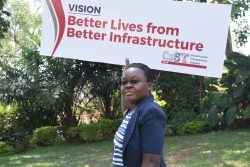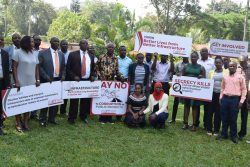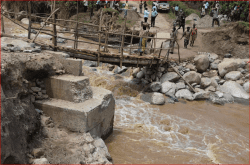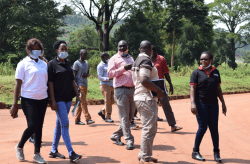
February 26, 2021 1:47 pm
The project aimed at strengthening transparency in procurement processes for infrastructure projects, through influencing reforms and practice across Government, private sector and the civil society stakeholders. This indicator was measured through the number of mentoring meetings held with the media to hold duty bearers accountable, number of CSOs and media with capacity to demand for reforms on fair business practices, the number of reforms on fair business practices adopted and the number of private sector organisations or groups demanding reforms on fair business practices. To realize this objective, we conducted one training for CSOs, 3 mentoring and follow meetings with journalists and 2 project learning and reflection meetings. The project has enabled capacity building for 57 journalists who are part of the CoST Uganda press team to document issue based infrastructure blogs and news highlights. Through our capacity building sessions, and physical engagements in the last one year of engaging on fair business practices, we have reached a total of 783 stakeholders. Journalists have published over 52 publications on the action during the project life time.
Of the 17 actions fronted, five have been acted upon. An action matrix has been developed to inform engagements and follow up on the pending actions by Government.
- PPDA revised guidelines for local governments for direct procurements to incorporate environmental, social, Health and Safety requirements for the procurement of works, requirement of contract prices in Uganda shillings, clarification on the instruction for submission of joint ventures/Consortium and Associations and editorial enhancements.
- PPDA adopted a rewarding process for most transparent entities, as an incentive for disclosure by Procurement Entities that shall be done annually. The Authority has embarked on drafting a national criteria for rewarding most transparent entities in public procurement where the infrastructure sector will be prioritized.
- PPDA reviewed bidding documents to include considerations for inclusion of women and young people, health, safety and environmental safeguards. And provision for participation/consultations between central and Local Governments on centrally procured infrastructure projects.
- PPDA developed guidelines for emergency procurements. CoST Uganda made input into the guideline that is under consideration by the Solicitor General of Government.
- PPDA strengthened its capacity building of PE officials on disclosure to focus on infrastructure projects and awareness raising on procurement processes, inclusion of women and young people, initiated regular engagements with stakeholders in the infrastructure sector and considers reviewing the reservation schemes into guidelines.
- PPDA is considering a review of reporting templates for procurement entities to include missing data points in the CoST IDS, and drafting a policy on data management and issuing regulations for infrastructure projects..
- Ministry of Works & Transport and PPDA initiated the process of updating the national providers register for contractors and consulting engineers. PPDA updated register to include women led companies, however, focus on infrastructure needs to be made.
- PPDA is considering incorporating the OC4IDS into the E-GP to standardise disclosure
- Ministry of Works and Transport and Ministry of Finance, Planning and Economic Development initiated process to establish a credit facility/guarantee fund for the private sector to access credit at lower interest rates.
- Making key critical sector issues such as disclosure of infrastructure data, local content, and inclusion as part of the performance indicators for the accounting officers in MDAs and Local Governments.
- Fast tracking the completion/update and classification of the National Register for providers
- Implementation of resolutions in the Cabinet paper on Local Content
- Turn Local content, joint ventures and reservation and preference schemes guidelines into Regulations.
- Awareness raising and training of public officials and private sector on procurement guidelines, taxation and local content provisions
- Government to establish alliances and business hubs at regional level with line sector Associations, lobby for members on issues such as taxation, global application of tax requirements.
- National Name and fame criteria of MDAs on compliance with the law – on key parameters such as delays in payments, disclosure, overruns, stakeholder engagement, inclusion, local content among others.
- National Name and fame criteria of MDAs on compliance with the law – on key parameters such as delays in payments, disclosure, overruns, stakeholder engagement, inclusion, local content among others.
